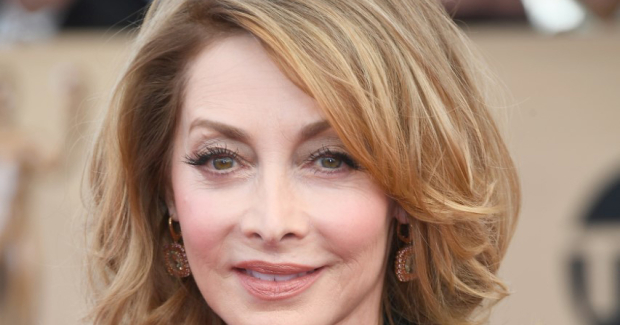Interview: Sharon Lawrence Talks About Playing Newspaper Publisher Katharine Graham in The Shot
Lawrence performs the solo play in a three-night run as part of the United Solo Festival.
For over 30 years, Sharon Lawrence has consistently toggled between theater, film, and television with great success, earning rave reviews for her turns as Velma Kelly in Broadway's Chicago, along with television's NYPD Blue (for which she received three consecutive Emmy Award nominations for her portrayal of Sylvia Costas) and Grey's Anatomy, among other notable series.
Now, after a long absence, Lawrence is returning to the New York stage for a three-night run in Robin Gerber's play The Shot, which will be presented as part of the 2022 United Solo Festival. The work is a fictional account of the life of Washington Post publisher Katharine Graham, who unexpectedly found herself in charge of the influential newspaper after her husband killed himself at age 48.
TheaterMania recently spoke to Lawrence, while she was shooting her latest TV series, Joe Pickett, in Canada, about why this play appealed to her, its reaction from female audiences, and her feelings about doing her first solo show.

(image provided by the production)
This interview has been condensed and edited for clarity.
Given that you studied journalism at college, what was your first reaction when you were asked to play Katharine Graham?
That was the main reason I agreed to read the play. My dad was a reporter for a large southeast TV station for over 30 years, and like Kay, I got interested in that world through my father. Actually, one of the first questions Robin asked me was "Do you know Katharine Graham was?"
Was the subject matter the only reason you agreed to read the script?
No. I liked that Robin, who is a first-time playwright, was both a biographer and a Washington insider. So, I knew she would approach this subject with an angle that might not be typical of other writers. And I always say yes to women contact creators; that's one of my core values. But I did wonder, will this script really be a play?
The play tackles some very difficult subject matter, including the domestic spousal abuse that Kay suffered for years. Did you have any misgivings about immersing yourself in this topic?
No. But the play isn't about the spousal abuse as much as it is an examination of mental illness, and that's what I was more drawn to. It's called The Shot because that's how her husband Philip took his own life in 1963, and three days later, Kay decided not to let the board of the Washington Post control the paper, so she took over. I had studied the subject of mental illness when I played Vivien Leigh in the play Orson's Shadow, but I felt I had to learn more about it to play Kay. My husband, who is a psychiatrist, was very helpful in getting me to understand the illogical. A person living with mental illness has no control, and the person living with them also has no control. It's such a difficult situation.
It's clear you've really come to admire Katharine Graham? Can you say why?
I always knew I wanted to be an actress but being publisher of one of the world's most influential newspapers was not her intended trajectory. What we learn from the play, and one of the things that most resonates for me, is how her life experience — both her struggles and her privilege — had prepared her for her future in ways she hadn't expected.
This play has had a long life before coming to New York. It was developed at the Ojai Playwrights Conference by you, Robin, and the director Michelle Joyner, and it has had many regional productions, including the one this summer at Berkshire Theatre Festival for which you've been nominated for Outstanding Solo Performance. What kind of audience reaction do you get when you do the show?
Whenever I've done the play, including on Zoom, we've done panel conversations after the performance. It's not an easy subject, but people everywhere want to share their stories. I believe community is being built through these experiences. To the three of us, The Shot is more than play, it's a forum for discussion. And we are proud that we're able to support anyone going through these challenges and that a woman like Kay can inspire people from all works of life. We've even used some of these performances to raise money and awareness for domestic abuse.
How does doing a solo piece differ from all the other theater you've done during your career?
My interest as an actress is in a telling story, and this one is so well-written and compelling to play that I had to say yes. Initially, I was concerned about being lonely onstage; but it's not lonely, in part because of my partnership with Robin and Michelle and the trust we have in each other. Plus, the other characters keep me company; technically, I play four people — although some people only hear three — so I don't ever feel alone.
Actors always say the audience is another character. What are you expecting from the New York audience?
Yes. The audience is definitely another character. And while I haven't played this festival before, I have done many shows in New York. So, I wouldn't underestimate this audience, especially because they know what solo theater is. I hope they love it as much as I do.








